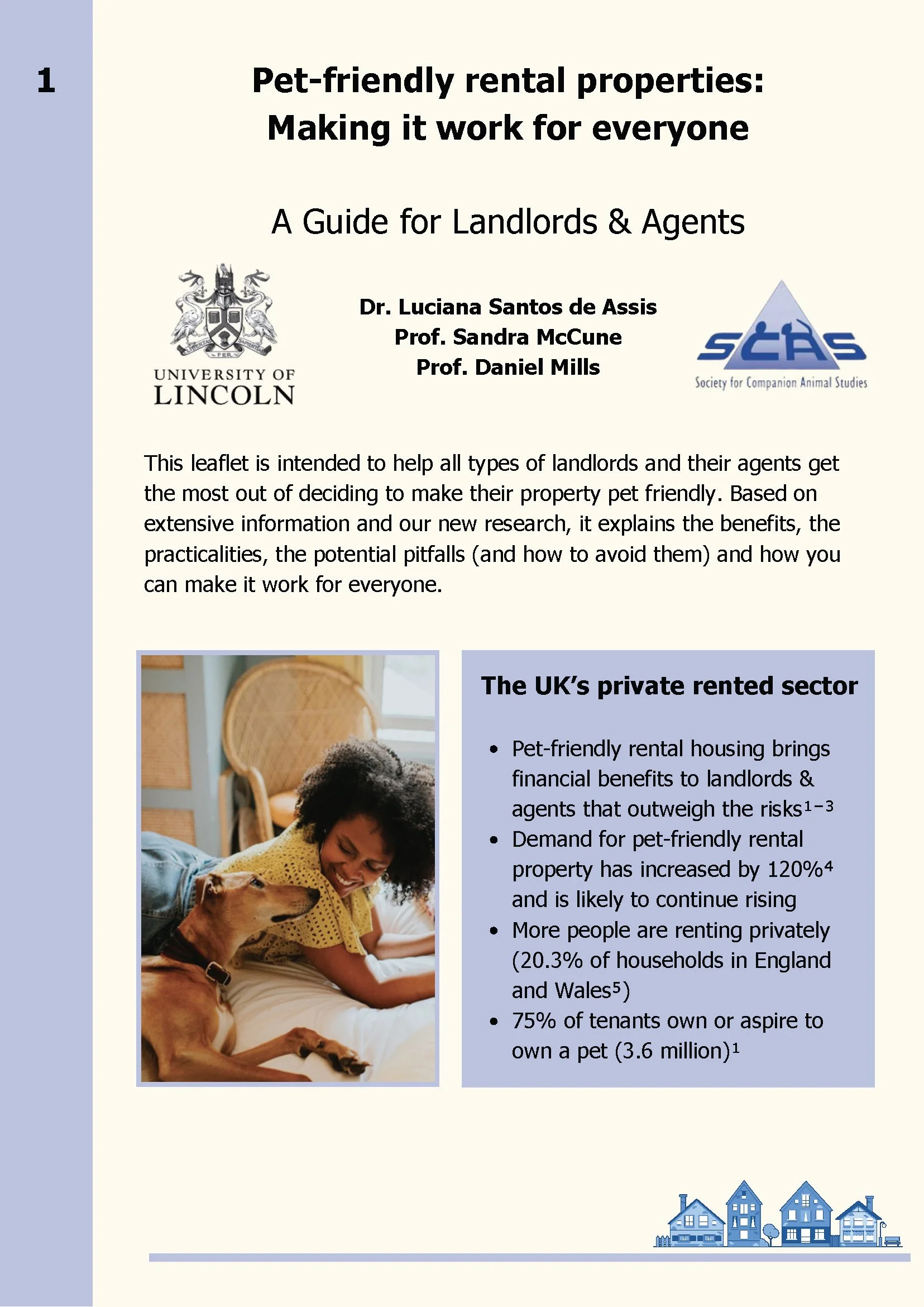Pet Friendly Housing
Many of us understand the deep joy and comfort that pets bring into our lives, providing physical and mental well-being. Yet, for many pet owners, the heartache of finding rental properties can be overwhelming. Landlords, often apprehensive about potential damage, hesitate to welcome pets into their properties. The fierce competition for pet-friendly rentals makes this struggle even more intense and financially draining. The Society for Companion Animal Studies (SCAS) is dedicated to easing this burden, striving to help responsible pet owners and their beloved pets live happily together through research and advocacy. As the Renters’ Rights Bill makes its way through the UK parliament, we continue to hope for positive change. SCAS continues its relentless efforts to promote these measures through research, conferences, and collaboration with stakeholders. A leaflet based on SCAS funded research has been developed to help landlords make their rentals more pet-friendly rentals.
The Need for Understanding
SCAS commissioned YouGov research in 2021 which revealed that the majority of pet owners favour the reintroduction of pet deposits (40%) or the option for landlords to require pet damage insurance (22%). An overwhelming 75% support positive pets in housing legislation. This survey sheds light on the mindset of pet-owning tenants, but our understanding of the issues affecting all parties, including pets and landlords, must deepen. Consequently, SCAS’ 2021 research funding call was focussed on pets in housing, resulting in six new studies providing new, original research to deepen understanding of the issues in Pet-Friendly Housing. For example, these studies have provided the evidence-based foundation to resources from the University of Lincoln and Michelson Found Animals, helping to educate UK and US landlords about how to develop pet inclusive rental properties. SCAS has also led scholarly works summarising research in this topic. SCAS continues to fund research in this area and currently supports research by Mackenzie Fong at Newcastle University, which aims to enhance pet-friendly policies of homelessness accommodation services (“hostels”) and to design a future study looking at the economic costs and benefits of improving pet-policies of hostels.
Advocacy for Positive Pets in Housing Regulations
Since its inception in 1979, SCAS has been a steadfast advocate for positive pets in housing regulations, conducting conferences and workshops throughout Great Britain, and presenting at international forums. The harms inflicted on people forced to choose between their homes and their cherished pets are severe and heartbreaking. Dr. Elizabeth Ormerod, SCAS Chair, reports that in over 40 years of veterinary practice, the most distressing cases she encountered involved people being compelled by landlords to give up their pets or face eviction. These individuals suffered chest and abdominal pains, retching, vomiting, uncontrollable shaking, and an inability to eat or sleep. Those who relinquished their pets experienced deep, unresolved grief, unsure of their beloved companion's fate. Some chose homelessness over separation from their pets, entering a cruel cycle where having a pet meant exclusion from most homeless shelters. Others, tragically, were driven to suicide, like John Chadwick. SCAS is proud to have supported Dee Bonett as she worked with Maidstone Borough Council to develop The John Chadwick Pet Policy which ensures that those with pets who have become homeless are supported in emergency accommodation until suitable permanent accommodation can be found – for both the homeless person and their pet.
Pet-friendly Rental Properties: Making it Work for Everyone
This leaflet is intended to help all types of landlords and their agents get the most out of deciding to make their property pet friendly. Based on extensive information and our new research, it explains the benefits, the practicalities, the potential pitfalls (and how to avoid them) and how you can make it work for everyone.
Safe Animal Friendly Environments (SAFE) Toolkits
SCAS has funded the development of two Toolkits designed to enable older people and their pets to remain together.
The SAFEPet@Facility Toolkit is a comprehensive risk assessment to be used by care home staff when someone is transitioning to a facility and wishes to bring their pet with them. This guides staff through aspects to be considered when planning for different species.
The SAFEPet@Home Toolkit provides people, and professional and family carers with key information on supporting the human animal bond when home care is required. There is much useful content about how to support the human animal bond in these situations.
The SAFE acronym = Safe Animal Friendly Environments.
The SAFEPet@Home Toolkit will be launched within a few weeks. It is anticipated that both will be adapted for use in other countries.
Guidance On Finding Pet-Friendly Accommodation And Information On The Type Of Questions To Ask A Housing Provider
While some care homes recognise the benefits of older people owning companion animals and as a result accept residents’ animals, pet-keeping rules are often drawn up arbitrarily and applied inconsistently. This can make the process of finding the right accommodation for you and your pet quite a challenge so we have listed below some suggestions of what to bear in mind when starting your search for pet-friendly accommodation.
Things to consider
Plan ahead – give yourself plenty of time to research your housing and care options. Any accommodation must be right for you, as well as your pet.
Speak to some of the organisations who provide information on sheltered accommodation and care homes which accept pets. e.g. Cinnamon Trust, Anchor, Lets with Pets from Dogs Trust, Battersea and Cat’s Protection. Expert help is out there on all aspects of choosing care, if you know where to look
Talk to several accommodation providers before making any decision
Remember that moving into a care home doesn’t have to be permanent – if you just need a short break to recover from illness or injury, then temporary pet care could be the solution
If possible, the final choice of accommodation should be made by the person needing care
For your own peace of mind it is important to make arrangements for any pets you have that may outlive you. If there is no-one you can ask, you may wish to approach The Blue Cross for help. The charity has a well established scheme called Pets into Care which deals with this concern
Whatever type of pet policy a housing provider may have, their attitudes and expectations about pet ownership are likely to vary depending on the experiences of the manager and staff. Before visiting a care home it’s a good idea to think about your responses to any concerns a housing manager might raise about pet ownership, and also to jot down any questions you might have yourself. Below are a few suggestions of topics to discuss.
Questions to ask a housing manager
Is there a written policy on pet ownership?
What types of pets are allowed or excluded?
Do other residents have pets?
Are there any communal pets?
Do you permit other visiting pets, such as Pets as Therapy (PAT) dogs?
If I am allowed to bring my pet and it subsequently dies, will I be able to replace it with another pet?
If at any stage I need assistance with the day-to-day care of my pet, will staff be able to help me?
If I am not able to keep my pet with me, would it be allowed to visit, or could you offer any assistance with re-homing it?
Issues a housing manager might raise
What happens to your pet if you become unable to care for it?
What if your pet becomes ill and requires expensive veterinary treatment?
We already have a communal pet. Why do you need your own as well?
Aren’t pets a source of disease, allergies, and accidents?






